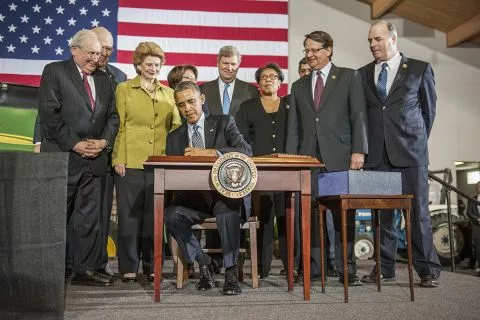Why agriculture matters
Agriculture is one of Michigan’s biggest industries, contributing an estimated $104.7 billion annually to the state’s economy and employing about 17 percent of the state’s workforce, according to Michigan Department of Agriculture and Rural Development figures.
Michigan is also one of the nation’s most agriculturally diverse states, with farmers producing more than 300 types of commercial crops and products.
Farmers, agribusiness groups and other observers who spoke with Bridge said Stabenow’s part in building out the industry can’t be overstated, citing her role in securing protections for fruit and vegetable growers, financial support for dairy farmers, promotion of agricultural exports and cultivation of agricultural research at Michigan State University and other institutions.
“Before I was in the Senate, fruits and vegetables were not anywhere part of the farm bill…no funding, nothing,” Stabenow told Bridge Michigan. “We broadened it out so that the farm bill policy covers all kinds of agriculture, all of Michigan’s small farmers, big farms, and expanded to urban agriculture.”
In 2014, at Stabenow’s urging, then-President Barack Obama signed that year’s farm bill on MSU’s campus.
“She’s been a huge supporter of everything at Michigan State and the state of Michigan, certainly in the ag bio area,” MSU President Kevin Guskiewicz told Bridge. “So are we worried? Yeah, because losing somebody who has been an advocate for this for so many years is a loss.”
Stabenow’s exit feels especially acute for fruit farmers, who fear grants, eligibility for crop insurance and other gains made under her tenure may backslide if the next committee chair is from a state with less agricultural diversity.
Juliette King-McAvoy, vice president of sales and marketing at King Orchards fruit farm in Northwest Michigan, said agriculture, particularly specialty crop growers, are at a “very critical and vulnerable moment” amid a changing climate, rising labor costs and pressure from lower-priced international imports.
“It definitely is a concern that the transition will come, and we will lose the spotlight,” she said.
Ignoring farmers’ needs would risk the state’s economic future and could put any Senate candidate’s campaign in peril, Victory, the state lawmaker, said.
“That is something I do believe will come into play in this race,” Victory said. “It is really critical to have somebody that does not just see it from a 30,000-foot level, but can get down to the granular level of all the diversity we have in the state of Michigan and agriculture.”





